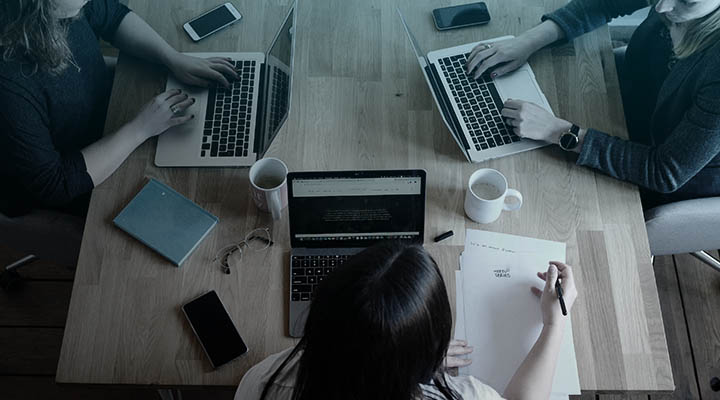2020 and Covid-19: What Can Be Learnt About Managing Change? Part 2
By Georgia Price, Becca Duncan, Georgina Wickman and Amin Rhalem, Consultants at BJSS
Earlier this week in Part 1, we asked BJSS’ People and Change experts for their thoughts on how organisations have reacted to the amount of change they’ve faced this year. Coping with the pace of change, supporting employees and looking beyond the immediate need were key themes for managing this well. In Part 2, we shift our focus to the future, as the team give us their thoughts on lessons learnt, change agendas for 2021, and how to embed and sustain change for the long term.
Here’s what they said:
Looking Forward, What Are The Key Lessons Learned From This Experience That Organisations Should Take On Board?
Amin: If I had to choose one lesson, it is to recognise the importance of business agility. Being able to react and adapt through changing environments has been a key success factor throughout the Covid-19 crisis. However, organisations will need to revisit their current operating structures to ensure they can maintain this rapid pace of decision making. Moreover, they need to be equipped with the right change practices to realise the desired business outcomes for the decisions being made.
Georgia: I completely agree. If you look at the organisations that have performed well this year, it has been those that have had the right strategy, practices and culture in place to pivot and try their hand at something new. On a more tactical level, I'd also add that communication continues to be key. We all experienced the societal impact of what happens when the rumour mill kicks in (I'll never take pasta for granted again) and similar situations can happen in organisations. Frequent, clear and transparent communication will help maintain trust with employees, reduce uncertainty and help them feel supported through times of change.
Do You Think Organisations’ People and Change Agenda Will Be Different For 2021?
Georgia: Yes. As we touched on in Part 1, I expect many organisations will be looking to make a decision on their long-term approach to flexible working, particularly when considering the high costs of renting offices spaces in major cities. Therefore, I imagine a lot of change efforts will be focused around this. More broadly, given the ongoing uncertainty around timelines and more permanent impact of the pandemic, I expect 2021 will also see organisations identifying where they can make smaller, tactical changes over wide-scale transformation programmes. With this in mind, it will be important to consider how to build an agile change management approach to reduce change fatigue with smaller, more frequent changes.
Georgie: Whilst I agree that the flexible working model should be a priority for an organisation’s people and change agenda, I also think that building genuine trust with employees needs to be continued through visibility, constant communication and clear policies on what this agenda may look like. Leadership will need to build touchpoints with their employees that allow them to support one another rather than feel like a micromanagement move, options need to be presented and agreed with employees and taking them on this journey should be a priority. Change should never feel like it is being ‘done’ to your employees but rather ‘with’ your employees. Instead of assuming what flexible working model they want, ask them and iterate it with them.
Finally, How Can Organisations Build On Any Momentum To Embed And Sustain Positive Changes For The Long Term?
Becca: To answer this question, I’m going to evaluate a few of the methods that few things we’ve called out, and think about their use for the long term;
- Removing the time and alternatives; applying pressure can be helpful, especially for quick decision-making. Capitalising on the momentum that has been externally generated means continuing to keep the pace – don't be afraid to test and learn to keep things moving.
- Engaging with employees, and an absolute focus on support; we know that most people don’t like change, and this is reflected in how often change programmes fail (over two-thirds of the time seems to come out as the statistic from most surveys on this matter). Change adoption across the workforce is essential for the success of programmes and supporting your people may be one of the most vital parts of realising the benefits of change. Whether it’s providing remote training opportunities, virtual meetups, or investing in technologies that give people the tools they need, making the upfront decisions to invest in this type of support won’t go amiss.
Amin: As organisations start to stabilise, they will need to overcome their next challenge which will be to try and sustain their newfound ways of working. Organisations need to understand that employees have had to undergo significant change and although some may be thriving in a remote environment, this is certainly not the case for all. Much like you would segment your customer base, recognising that employees have different needs will be the key to creating an employee experience that is both personalised and meaningful. What will be interesting is seeing the ways in which organisations try tackle these changes in a remote setting!
In some respects, Covid-19 has presented a great opportunity for organisations to accelerate their pace of change. However, it’s also brought with it a whole host of challenges: one of the biggest being how to sustain a flexible working model for the long term. Look out for our next series on remote working, where we'll be discussing the key elements required to enable a successful remote workforce as companies prepare themselves for (a hopefully less eventful) 2021.
Published
April 29, 2024Reading time
3 minutesRelated posts





